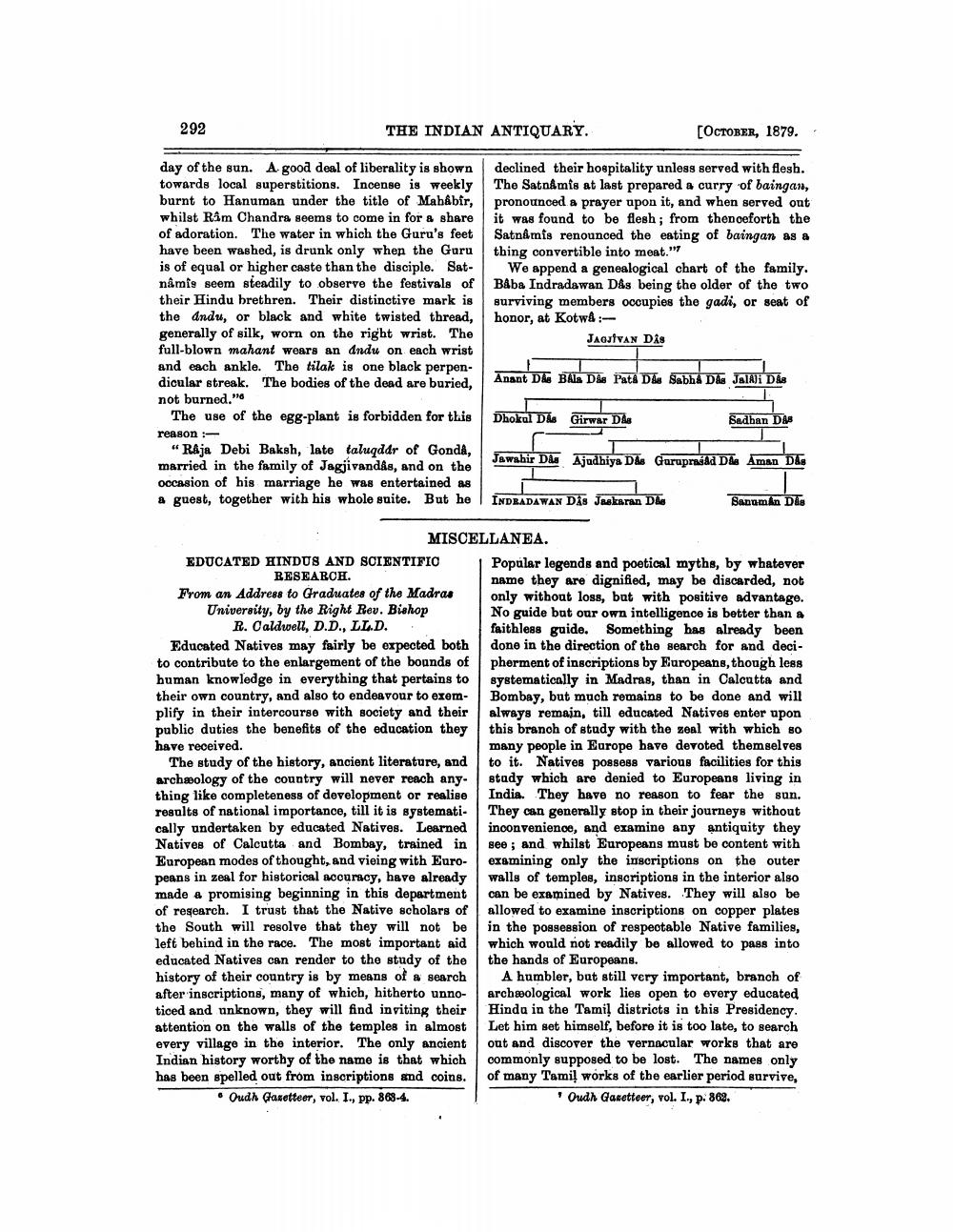________________
292
THE INDIAN ANTIQUARY.
[OCTOBER, 1879.
day of the sun. A good deal of liberality is shown towards local superstitions. Incense is weekly burnt to Hanuman under the title of Mahabir, whilst Rim Chandra seems to come in for & share of adoration. The water in which the Guru's feet have been washed, is drunk only when the Guru is of equal or higher caste than the disciple. Satnâmis seem steadily to observe the festivals of their Hindu brethren. Their distinctive mark is the indu, or black and white twisted thread, generally of silk, worn on the right wrist. The full-blown mahant wears an Indu on each wrist and each ankle. The tilak is one black perpendicular streak. The bodies of the dead are buried, not burned."
The use of the egg-plant is forbidden for this reason -
"Raja Debi Baksh, late taluqddr of Gonda, married in the family of Jagjivandås, and on the occasion of his marriage he was entertained as a guest, together with his whole suite. But he
declined their hospitality unless served with flesh. The Satnamis at last prepared a curry of baingan, pronounced a prayer upon it, and when served out it was found to be flesh; from thenceforth the Satnamis renounced the eating of baingan as & thing convertible into meat."
We append a genealogical chart of the family. Baba Indradawan D&s being the older of the two surviving members occupies the gadi, or seat of honor, at Kotwa:
JAGJIYAN Dis
Anant Dás Bala Das Path DÅs Sabha Das JalAli Das
Dhokal Das Girwar Das
Sadban Das
Jawahir Das
Ajndhiya Das Guruprasdd Dda Aman Das
INDBADAWAN Dis Jaskaran Dle
Banomen Das
MISCELLANEA. EDUCATED HINDUS AND SCIENTIFIC
Popular legends and poetical myths, by whatever RESEARCH.
name they are dignified, may be discarded, not From an Address to Graduates of the Madras
only without loss, but with positive advantage. University, by the Right Rev. Bishop No guide but our own intelligence is better than a R. Caldwell, D.D., LL.D.
faithless guide. Something has already been Educated Natives may fairly be expected both done in the direction of the search for and decito contribute to the enlargement of the bounds of pherment of inscriptions by Europeans, though less human knowledge in everything that pertains to systematically in Madras, than in Calcutta and their own country, and also to endeavour to exem- Bombay, but much remains to be done and will plify in their intercourse with society and their always remain, till educated Natives enter upon public duties the benefits of the education they this branch of study with the zeal with which so have received.
many people in Europe have devoted themselves The study of the history, ancient literature, and to it. Natives possess various facilities for this archæology of the country will never reach any. study which are denied to Europeans living in thing like completeness of development or realise India. They have no reason to fear the sun. results of national importance, till it is systemati- They can generally stop in their journeye without cally undertaken by educated Natives. Learned inconvenience, and examine any antiquity they Natives of Calcutta and Bombay, trained in see ; and whilst Europeans must be content with European modes of thought, and vieing with Euro- examining only the inscriptions on the outer peans in zeal for historical accuracy, have already walls of temples, inscriptions in the interior also made a promising beginning in this department can be examined by Natives. They will also be of research. I trust that the Native scholars of allowed to examine inscriptions on copper plates the South will resolve that they will not be in the possession of respectable Native families, left behind in the race. The most important aid which would not readily be allowed to pass into educated Natives can render to the study of the the hands of Europeans. history of their country is by means of a search A humbler, but still very important, branch of after inscriptions, many of which, hitherto unno- archeological work lies open to every educated ticed and unknown, they will find inviting their Hinda in the Tamil districts in this Presidency. attention on the walls of the temples in almost Let him set himself, before it is too late, to search every village in the interior. The only ancient out and discover the vernacular works that are Indian history worthy of the name is that which commonly supposed to be lost. The names only has been spelled out from inscriptions and coins. of many Tamil works of the earlier period survive, • Oudh Gazetteer, vol. I., pp. 868-4.
"Oudh Garetteer, vol. I., p. 862.




